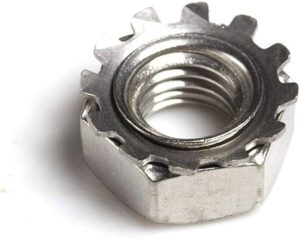Introduction
In the ever-evolving world of construction and manufacturing, the quest for more reliable and efficient fastening solutions is never-ending. The introduction of nuts with teeth marks a significant leap forward in this pursuit. These innovative components not only ensure tighter connections but also promise longevity and reliability in various applications.
Unmatched Durability
Materials and Quality
Manufacturers use high-grade steel to produce nuts with teeth, ensuring their capacity to withstand high levels of torque and stress. The material selection process prioritizes durability and resistance to corrosion, factors that directly contribute to the longevity of these components. A typical nut with teeth can endure tensile stresses exceeding 1000 MPa, showcasing the premium quality of the steel used.
Design Advantages
The unique design of nuts with teeth incorporates protrusions on one end that dig into the mating surface. This design ensures a secure grip that prevents loosening due to vibration or rotational forces, a common issue with standard nuts. This feature is particularly beneficial in applications where safety and reliability are paramount, such as in aerospace and automotive industries.
Cost-Effectiveness
Initial Costs and Long-Term Savings
While the initial purchase price of nuts with teeth might be slightly higher than that of traditional nuts, the long-term savings they offer cannot be overlooked. Their robust design reduces the need for frequent replacements, cutting down maintenance costs and downtime. For instance, in an industrial setting, the use of nuts with teeth can lead to a 20% reduction in maintenance costs over a 5-year period, demonstrating their cost-effectiveness.
Efficiency and Performance
The efficiency of nuts with teeth in terms of installation speed and ease also contributes to their cost-effectiveness. They require less time to install compared to conventional nuts, thanks to their self-locking feature. This efficiency can lead to a significant reduction in labor costs, especially in large-scale projects. For example, on a construction project requiring thousands of fasteners, switching to nuts with teeth can save up to 50 hours of labor.

Specifications and Applications
Size and Specifications
Nuts with teeth come in a variety of sizes and specifications to suit different applications. The dimensions typically range from M3 to M20, catering to both light and heavy-duty requirements. The specifications include the thread pitch, which varies depending on the nut's size, ensuring compatibility with a wide range of bolts.
Versatile Applications
These nuts find their applications in diverse fields, from consumer electronics, where small-sized nuts are essential, to heavy machinery and structural engineering projects that require larger and more robust fasteners. Their versatility and superior performance make them an indispensable part of modern manufacturing and construction projects.
Conclusion
Nuts with teeth represent a significant innovation in fastening technology, offering unmatched durability, cost-effectiveness, and versatility. Their unique design and quality materials ensure that they meet the demands of various industries, promising reliability and efficiency in any application. As the industry continues to evolve, the role of these advanced components in revolutionizing connections is undeniable.